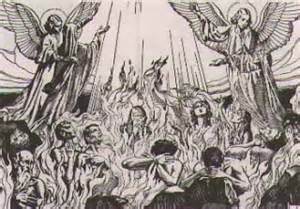
There are 7 chief spiritual works of mercy and they are…..
1) To admonish the sinner.
This means to try to persuade him to turn from evil and to practice virtue. It should be done in true charity, with words that are kind, but also direct if need be. We should do this whenever prudence dictates. We are not obliged to do it, when, for example, we judge that our words will not be heeded or that greater obligation than others in this regard. Sinners may be admonished not only by kind and careful words, but also by our good example. Consider how often the Word of God and the saints praise true admonishment:
 Proverbs 27, 5-6 “Open rebuke is better than hidden love. Better are the wounds of a friend, than the deceitful kisses of an enemy.”
Proverbs 27, 5-6 “Open rebuke is better than hidden love. Better are the wounds of a friend, than the deceitful kisses of an enemy.”
St. James 5, 19-20 “My brethren if any of you err from the truth, and one converts him; He must know that he who causes a sinner to be converted from the error of his way, shall save his soul from death, and shall cover a multitude of sins.”
St. Basil the Great “Here is how a friend differs from a flatterer: the flatterer speaks to give pleasure, but the friend refrains from nothing, even that which gives pain.”
2) To instruct the ignorant.
Teachers in Catholic schools, missionaries, catechists, confessors, and Catholic writers perform in an excellent manner the spiritual work of instructing the ignorant. Those who help support Catholic schools, colleges, and missions, as well as those who teach merely secular subjects, perform this work of mercy provided the motive of their actions is love of God and neighbor.
St. John Chrysostom. “What greater work is there than training the mind and forming the habits of the young?”
St. Augustin. “….Let anyone who is instructing another pass on to him whatever he has received without haughtiness or grudging.”
Pope St. Gregory the Great. “The seed of words grows very well when the humanity of the teacher softens and moistens the breast of the hearer.”
3) To advise the doubtful
Whenever their words are likely to be heeded, Christians must be ready to give helpful advice to those who need it. It may involve clarifying a teaching of the Church which is misunderstood, giving good advice about moral issues to someone trying to make a choice, or simply helping someone to give priority to the spiritual good of the soul, or the faith, over other issues.
4) To console the sorrowful
To console those who are in sorrow because of the death or sickness of loved ones, or because of some other spiritual or temporal affliction is an act of Christian charity. How many people today need encouragement and hope! Many suffer from depression or discouragement, and a few words about the love and goodness of Our Lord or Our Lady can make all the difference.
Job 19, 21 “Have pity on me, at least you my friends, because the hand of the Lord has touched me.”
Galatians 6, 2 “Bear you one another’s burdens, and so you shall fulfill the law of Christ.”
1 Thessalonians 5, 14 “And we beseech you, brethren…comfort the feeble-minded, support the weak, be patient towards all men.”
5 & 6) To bear wrongs patiently, and to forgive all injuries
These two works of mercy are both passive and active. Patience and forgiveness start firstly in our soul, but they also should be shone outwardly. The true Christian imitates the example of Christ by bearing wrongs patiently and by forgiving all injuries for the love of God. While dying on the cross, Christ prayed to His heavenly Father to forgive His executioners “for they do not know what they are doing.” The true Christian loves all men, even those who reproach and persecute him.
Colossians 3, 13 “Bearing with one another, and forgiving one another, if any have a  complaint against another, even as the Lord has forgiven you, so do you also.”
complaint against another, even as the Lord has forgiven you, so do you also.”
St. Matthew 6, 14 -15 “For if you will forgive men their offenses, your heavenly Father will forgive you also your offenses. But if you will not forgive men, neither will your Father forgive you your offenses.”
Proverbs 19, 11 “The learning of a man is known by patience, and his glory is to pass over wrongs.”
7) To pray for the living and the dead
The sublime doctrines of the Communion of Saints and the Mystical Body of Christ should make us pray for all our brothers in Christ.
